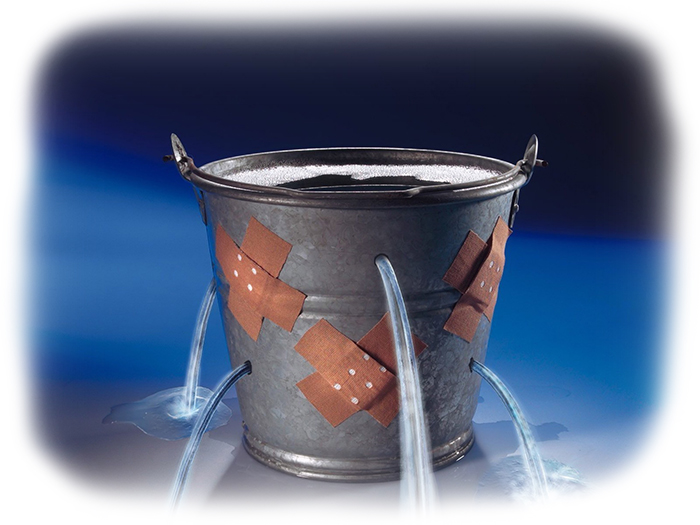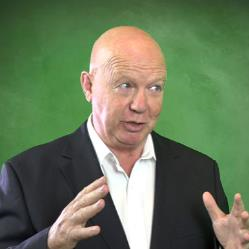
"Good sales managers lead and coach their people to success" - Interview by John Smibert
I recently had the pleasure of talking with international sales expert Dylis Guyan about sales management.
Before I share that discussion with you first let me introduce the subject. My friend Tony Hughes says that "sales management is the weakest link in the revenue chain". I agree with him.
Unfortunately too many organisations don't recognise that the sales manager is key to sales and revenue success. We tie them down with administrative management activities, particularly managing numbers, and don't encourage enough time in the field developing and supporting their salespeople. The result is poor sales results and a lack of revenue sustainability - not to mention a high failure rate and turnover of their team members.
 I therefore asked Dylis what she saw that the better sales managers do in organisations that understand the importance of good sales leadership and who build a positive sales management culture.
I therefore asked Dylis what she saw that the better sales managers do in organisations that understand the importance of good sales leadership and who build a positive sales management culture.
In this discussion she emphasises a number of things they do, firstly good on-boarding and secondly monitoring activity - not just outcomes and then responding with coaching. She said most sales managers spend time looking at the numbers, analysing how many contacts, how many appointments, how many presentations, how many sales, what's the value. However the good ones will go out and observe, and they will coach that person to improve in areas identified through the numbers and observation.
In this interview Dylis makes a number of great suggestions on how sales managers can become a good leader, helping their people become sustainably successful.
I think you will learn from this and get some actionable tips on how to improve your sales management capability.
****************
Dylis Guyan is based in Oxford, England and is an international sales and marketing expert, trainer, coach and speaker. She is also founder of the B2B Sales Academy.
Interview
John: Hello, I've got Dylis Guyan with me again - welcome back, Dylis!
Dylis: Hello, John!
John: Hey, we better let you go and get out of Sydney - you've been here a long time now!
Dylis: That's right, yes! [laughs]
John: Hey Dylis, I wanted to get your views around sales management. Tell me what you think the better sales managers do to get better results from their sales team?
Dylis: Okay. Well, I'm going to start right at the beginning here, in terms of when a sales manager takes on a new salesperson, they really need to be showing them exactly what they want them to do in terms of attracting, converting and retaining clients, because - again, from my experience - I see sales managers very often just assume that the new salesperson knows what to do.
 John: So that whole process of onboarding a new salesperson is vital, isn't it, in organisations.
John: So that whole process of onboarding a new salesperson is vital, isn't it, in organisations.
Dylis: Completely.
John: It's not just chucking a bit of product knowledge at them.
Dylis: Yes. And I'm sure you've seen this, John, that the product training takes precedence over the marketing and sales.
John: It's sad but it's true.
Dylis: Yes. So, that would be my first port of call, and of course it's checking with that salesperson as to what they do know, and then taking him through the process of how to attract, convert and retain a client.
John: Very good advice. And it is sad to see out there that even really good salespeople that are brought on board often fail because of that lack of attention, onboarding and coaching by the sales manager.
Dylis: Yes. And then what the good sales managers will do is they won't just manage results, they will actually look at the activity that's giving the result, but more importantly look at the competency.
John: Right, and coach that.
Dylis: And coach the competency so that each element of the activity gets better to give the better result.
John: I totally agree. The really good sales managers that I know are brilliant at that. Whether you look at leading indicators or lagging indicators, it's understanding all that activity, and the indicators that are indicating the progress and activity, and then coaching to those.

Dylis: Yes. Because as many salespeople will say, "I need more leads," or the manager will say, "Go and see more people." But actually, you might have someone who's really great at getting the appointment, but then when they get to the face to face meeting, it just falls apart.
John: Yes, they're probably dumping product on the customer and not thinking about the sales process or understanding what selling really is.
Dylis: That's right. Or, you may have someone who's selling but they're selling low-value.
John: Yes.
Dylis: So, there's something happening there that needs to be improved in terms of the competency, but this can only be done when the sales manager is absolutely committed to those sales individuals, making sure that they know the what, why and how of the process.
John: There's a real difference between a sales manager and a sales leader, isn't there?
Dylis: Completely, yes.
John: Management in a lot of people's terms is managing the numbers, the spreadsheets, driving with a whip and so on. The real sales leadership are good coaches, and they actually provide the leadership for people to be successful.
Dylis: Yes. And that really is the purpose of their role. Anybody can crunch numbers.
John: Yes, exactly.
Dylis: This is really a passion of mine. I'm passionate about making sure the business owners and salespeople know the process, and the sales leaders or managers, they should be as passionate about that, and you can only do it by going in and observing. You can look at the numbers, you can analyse how many contacts, how many appointments, how many presentations, how many sales, what's the value, but the good ones will go out and observe, and they will coach that person to improve in that particular area.
John: And very important here, not take over either.
Dylis: Completely not, yes.
John: Let the salesperson make the mistakes, then come back and talk about it and coach it, rather than taking over and destroying their own salesperson's credibility and impacting self-esteem and so on.
 Dylis: Yes, yes. I see this much like a bucket that has got holes in it and it's leaking. It's about fixing one of the holes, then fixing another hole and fixing another hole until it doesn't leak so that that bucket is complete and holds the water.
Dylis: Yes, yes. I see this much like a bucket that has got holes in it and it's leaking. It's about fixing one of the holes, then fixing another hole and fixing another hole until it doesn't leak so that that bucket is complete and holds the water.
John: But those holes are so important, because we learn because of the mistakes we make, and if we're allowed to make the mistake and then talk about the mistake, we'll learn from it. That's good coaching.
Dylis: Yes. And I have a very simple philosophy that says, "Nobody gets up in the morning to go to work to do a really bad job and fail. Nobody."
John: I don't know anybody that does that.
Dylis: Exactly. They do what they think is the right thing to do.
John: Yes.
Dylis: It's the role of the sales leader to develop that person, to allow them to grow into the potential and to exceed beyond their expectations.
John: This is wonderful advice, Dylis, and it reflects a lot of my own thinking, and I have the same passion you have. Sales managers can change the world.
Dylis: Yes.
John: There's 30 million plus salespeople out there. If the sales managers are doing the right coaching, we can all be having the right sort of discussions with our customers to really drive a lot more value for everybody in this world.
Dylis: Yes. And I'd just like to add also that the sales leaders, sales managers, they need attention too in terms of their development, because they are not doing it wrong deliberately; they are doing what they think is the right way to do it, and so they need the skills.
 John: Absolutely. I had a great discussion with Sue Barrett recently and she was emphasising that if we develop our sales managers, our sales leaders, then that's where most of our investment should be, not in just training salespeople all the time when we haven't got sales leaders who'll help those salespeople develop. Sales leadership is where we should be investing.
John: Absolutely. I had a great discussion with Sue Barrett recently and she was emphasising that if we develop our sales managers, our sales leaders, then that's where most of our investment should be, not in just training salespeople all the time when we haven't got sales leaders who'll help those salespeople develop. Sales leadership is where we should be investing.
Dylis: Yes. And nearly without exception, I have done it without, but I would always recommend to companies when I'm doing training of their sales teams that the managers are involved, because sometimes they haven't been in the sales role for a long time and they'd forgotten some of the steps of the process, and it brings a cohesive result when you have them together.
John: They'll learn, but their salespeople that are in the same room will learn from them during the training. The training is very much about discussion and learning from each other, and those sales managers need to be there to learn how much their salespeople don't know, but also help them learn more as well as learn more themselves.
Dylis: Yes, exactly.
John: This is great advice, Dylis, and I've had some wonderful discussions with you - thank you very much!
Dylis: I've loved it, John - thank you so much for inviting me!
***********
More discussions with Dylis:
****************

Your Invitation: I invite you to join the Sales Leader Forum group on LinkedIn where you can experience informative discussions with your peers and sales thought leaders on subjects like the one we have discussed here. I also invite you to subscribe to the
- Sales Leader Resource Centre here
- Sales Leader YouTube channel here (300+ sales leadership videos)
Please Share: If you valued this article, please share via your Twitter, LinkedIn, Google+ and Facebook social media platforms. I encourage you to join the conversation or ask questions. So feel free to add a comment on this post - I promise to respond. If inclined please follow my LinkedIn post page here.
Want to touch base? If you have questions please feel free to contact me - email: john.smibert(at)salesleaderforums.com, Phone: +61 404857893 or Skype: john.smibert